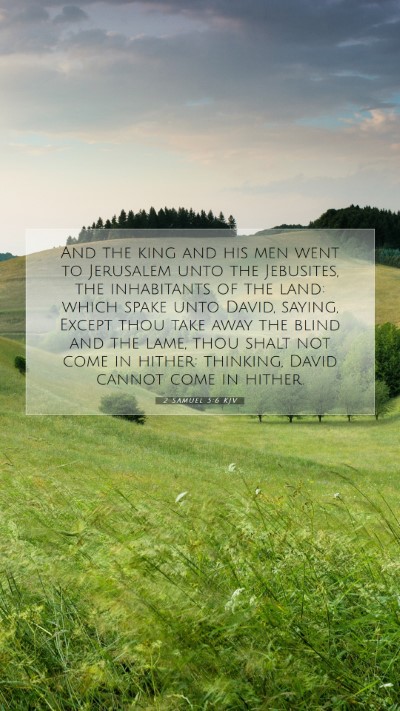Bible Verse Explanation: 2 Samuel 5:6
Bible Verse: 2 Samuel 5:6 - "And the king and his men went to Jerusalem unto the Jebusites, which were the inhabitants of the land: which spake unto David, saying, Except thou take away the blind and the lame, thou shalt not come in hither: thinking, David cannot come in hither."
Overview
This verse depicts a pivotal moment in the biblical narrative regarding King David's conquest of Jerusalem, highlighting the challenges he faced from the Jebusites, the city's original inhabitants. Understanding this passage requires a deep dive into its historical context, literary importance, and theological implications, providing rich insights into its meaning and significance in Scripture.
Scripture Analysis
The account in 2 Samuel 5:6 serves multiple purposes in the text. Here are some critical points of analysis:
- Historical Context: The Jebusites were a Canaanite tribe that occupied Jerusalem at the time David sought to establish it as his capital. David’s approach to capturing the city represents a significant shift in his reign.
- Symbolism: The mention of the "blind and the lame" by the Jebusites is deeply symbolic, reflecting their disdain for David’s ability to seize the city, while also highlighting their false sense of security.
- Theological Significance: This verse underscores God’s providence in fulfilling His promises to David. This event marks the consolidation of Israel’s political power under David and emphasizes God’s sovereignty in Israel’s history.
Bible Verse Meanings and Interpretations
Several public domain commentaries provide profound insights into this verse:
Matthew Henry's Commentary
Matthew Henry discusses the audacity of the Jebusites in their claims against David and highlights their arrogance. He remarks that their declaration reveals their ignorance of God's power and David's capability. He further asserts that the success of David in overcoming such challenges is a testament to divine support.
Albert Barnes' Notes on the Bible
Albert Barnes emphasizes the mockery of the Jebusites in viewing the blind and lame as defenders of their city. This phrase illustrates their belief that even the weakest among them could deter a powerful leader like David. Barnes notes that this attitude ultimately reflects the heights of their folly in underestimating David's resolve and divine backing.
Adam Clarke's Commentary
Adam Clarke provides an analysis of David’s military strategies, arguing that his determination, coupled with divine guidance, was crucial in ultimately breaching the defenses of Jerusalem. He points out that the Jebusites’ confidence was misplaced, and their claims about the blind and lame indicate their despair as their stronghold was about to be compromised.
Understanding Scripture Through 2 Samuel 5:6
For a deeper understanding of this verse, consider the following themes:
- Courage and Leadership: David's determination to capture Jerusalem showcases his courage as a leader, essential for the future of Israel.
- God’s Sovereignty: This verse highlights the overarching theme of God's sovereignty, as David’s success reflects God’s active role in guiding His chosen king.
- Overcoming Challenges: The encounter with the Jebusites serves as a metaphor for any barriers faced by believers today when pursuing God’s will.
Practical Applications
Applying the insights from 2 Samuel 5:6 to daily life can be transformative. Here are a few applications:
- Embrace Challenges: Just as David faced the Jebusites, believers are encouraged to confront challenges with faith and determination.
- Trust in God's Power: This verse reassures believers to rely on God's strength when facing seemingly insurmountable obstacles.
- Confidence in Leadership: Recognizing the importance of strong and faithful leadership can inspire individuals in positions of influence.
Related Bible Cross References
- Joshua 15:8: References the territory held by the Jebusites.
- 1 Chronicles 11:4-9: Offers a parallel narrative involving David's conquest of Jerusalem.
- Psalm 122:1-3: Reflects the significance of Jerusalem as a place of worship.
Conclusion
In conclusion, 2 Samuel 5:6 holds profound implications for understanding biblical history, leadership, and God's sovereignty. A thorough examination of this verse serves as a crucial component for effective Bible study and theological reflection. As we engage with these scriptures, we gain a richer insight into God's unfolding plan through David and ultimately through Christ.
By studying this passage in detail, we enhance our Bible verse understanding, deepen our Bible verse explanations, and contribute to meaningful Bible study insights that resonate with contemporary faith challenges.


